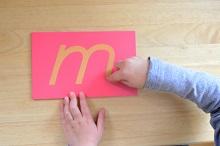
Montessori education is becoming increasingly popular in many preschools in France and around the world. However, studies evaluating its effects on early childhood development are rare. In an article published in the journal Child Development, scientists from EDUWELL CRNL and TRAJECTOIRES CRNL describe the results of the first randomized controlled study comparing the Montessori method to conventional teaching in a French public preschool.
Social and economic disparities largely affect the academic, cognitive, and socio-emotional development of children. Because these disparities can impact children as early as age 4, there has been a renewed interest in preschool programs as a way to reduce their influence on learning and development. However, very little is known about the effectiveness of different preschool programs. One particular preschool curriculum that is currently experiencing a surge in popularity across many Western countries is the Montessori method, which appears to align with principles of learning and development. Yet, previous research on Montessori education is limited, inconsistent, and tends to focus on children from high socio-economic backgrounds. Therefore, how effective is the Montessori preschool curriculum compared to other more conventional programs is unclear.
A home-grown initiative among educators who work in an economically disadvantaged area outside Lyon, France, led them to randomly assign preschool children to either Montessori or conventional classrooms in their local public school. This provided us with the singular opportunity to carefully plan a three-year-long study to examine and compare the progress of two groups of 3- to 6-year-olds; to sharpen the comparison, we added a third group of children from a private Montessori preschool located in a more privileged area in Lyon that was accredited by the Association Montessori Internationale. All told, 176 5- to 6-year-old kindergarteners were compared cross-sectionally and 70 of these were followed longitudinally from preschool entry (age 3) to the end of kindergarten (age 6). These children were tested on a range of tasks assessing a) language, b) mathematical, b) executive and d) social abilities.
Both the cross-sectional and longitudinal analyses on math, executive function and social skills showed that performance among the two groups of disadvantaged kindergarteners in the public school was comparable. Interestingly, however, the kindergarteners in the public school's Montessori classrooms outperformed their peers in the conventional classrooms on reading. The superior reading performance turned out to be comparable to that of the more advantaged kindergarteners from the accredited private Montessori preschool.
These results have two important implications for early childhood education. First, the study demonstrates that a structured preschool curriculum such as the one used in the French public school system may lead to outcomes that are largely comparable to a Montessori-inspired program across a wide range of academic, cognitive, and social skills in disadvantaged children. Second, the results suggest that the Montessori literacy curriculum may be particularly well suited to the development of early reading skills and that it can be implemented by teachers with limited training with the Montessori method. Not only are several beneficial features of this curriculum supported by cognitive research, its introduction in preschool does not appear to impact other learning domains. Thus, a greater implementation of principles underlying the Montessori literacy curriculum in preschool programs may advance the acquisition of early reading skills and reduces early literacy inequalities among young children.
Courtier P, Gardes ML, Van der Henst JB, Noveck IA, Croset MC, Epinat‐Duclos J, Léone J, Prado J. Effects of Montessori Education on the Academic, Cognitive, and Social Development of Disadvantaged Preschoolers: A Randomized Controlled Study in the French Public‐School System. Child Development, 01 May 2021, Pages 1–20. https://doi.org/10.1111/cdev.13575











